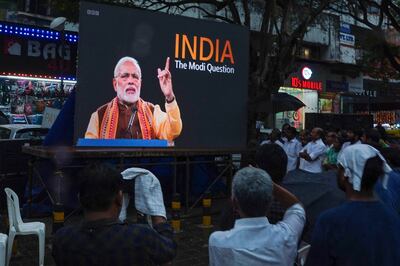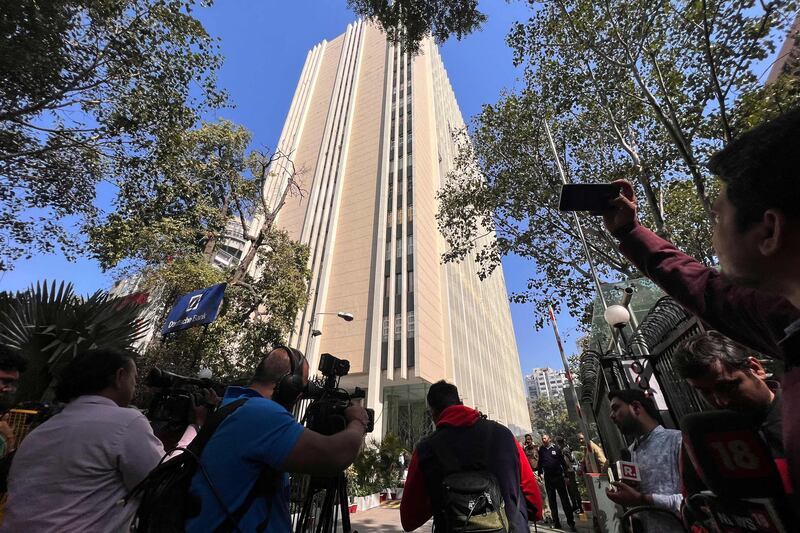India’s Income Tax department on Tuesday raided the offices of the BBC in the capital Delhi and 20 other locations across the country, weeks after the UK broadcaster released a documentary critical of Prime Minister Narendra Modi.
A team of 15 officials from the tax department arrived at the BBC offices near Connaught Place — the British-era main commercial hub in New Delhi at around 11.30am.
They conducted a “survey” related to alleged “tax evasion links,” a move condemned by opposition figures as an attack on free speech.
The BBC offices in New Delhi released a statement on Tuesday confirming that “the Income Tax Authorities are currently at the BBC offices in New Delhi and Mumbai and we are fully co-operating. We hope to have this situation resolved as soon as possible.”
The office complex was closed and no one was allowed to enter or leave the 18-storey office complex.
Police were seen moving into the office complex which was cordoned off from visitors.
The phones of employees were confiscated by officials who reportedly were checking documents related to business operations and accounts.
One employee, just before her phone was seized, told The National that two floors of the BBC office were being raided while employees were asked “to sit down”.
Raids were conducted at two offices in Mumbai — the financial capital city. Employees who were there were asked to leave and others were asked to work from home.
The raids come weeks after Mr Modi’s government blocked the airing of the two-part BBC documentary titled India: The Modi Question.
The documentary questioned Mr Modi's leadership during the 2002 Gujarat riots, when he was the chief minister of the western state.

The BBC has not aired the documentary in India but the video was available on some YouTube channels.
It was immediately denounced as propaganda by Mr Modi’s government and banned from online circulation, using emergency powers available under information technology rules.
The government had ordered Twitter to block over 50 tweets with links to the documentary and YouTube to block any uploads, renewing debate about freedom of expression in the world’s largest democracy.
The second part of the documentary focuses on government policies since Mr Modi became Prime Minister in 2014, after a landslide election win by his Hindu nationalist Bharatiya Janata Party.
The raids have sparked outrage on social media with opposition leaders and journalists Among others calling the crisis an “undeclared emergency”.
Congress, the main opposition party, called the raids “undemocratic”.
“The IT raid at BBC’s offices reeks of desperation and shows that the Modi government is scared of criticism. We condemn these intimidation tactics in the harshest terms. This undemocratic and dictatorial attitude cannot go on any longer,” KC Venugopal, a Congress parliamentarian, said.
Mehbooba Mufti, the President of Jammu and Kashmir People’s Democratic Party, wrote on Twitter: “Cause & effect of raids on the BBC Office is quite obvious. GOI is brazenly hounding those who speak the truth. Be it opposition leaders, media, activists or anyone else for that matter. The gloves are off & there is a price one pays for fighting for truth.”
The Bharatiya Janata Party, however, justified the raids by claiming that the BBC was carrying out a “divisive agenda” in the country.
“BBC unleashed the most venomous attack against our country in one of their programmes … it indulges in anti-Modi propaganda … how venomous, shallow the reporting of the BBC is … They try to attack the sovereignty of this country,” Gaurav Bhatia, a BJP spokesman said on Tuesday.
“IT department should be allowed to work. BBC has become the world’s most corrupt corporation … India is a country which gives an opportunity to every organisation and individual as long as they don’t have a hidden agenda and spew venom … this can’t be tolerated,” Mr Bhatia said.
India’s Supreme Court last week dismissed a petition that sought a complete ban on the BBC in the country over its documentary.






